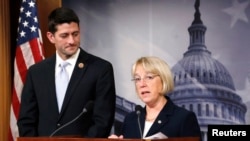CAPITOL HILL —
A group of U.S. lawmakers has forged a bipartisan agreement on federal spending levels for a two-year period that will prevent another government shutdown if it becomes law. The accord lessens austerity budget cuts but does not solve America’s long term fiscal imbalances.
The deal announced late Tuesday constitutes a compromise between the starkly different budgetary visions of the Republican-led House of Representatives and the Democratic-controlled Senate. House Budget Committee Chairman Paul Ryan hailed the accord at a Capitol Hill news conference.
“This agreement makes sure that we do not have a government shutdown scenario in January. It makes sure that we do not lurch from crisis to crisis,” said Ryan.
The accord would boost 2014 and 2015 federal spending above austerity levels set under current law, shielding many domestic and military programs from further automatic budget cuts, known as sequestration, that would have taken effect absent a deal. The added spending was a key goal of Senate Budget Committee Chairwoman Patty Murray.
“Our deal puts jobs and economic growth first by rolling back sequestration’s harmful cuts to education and medical research and infrastructure investments and defense jobs for the next two years,” said Murray.
The agreement more than compensates for higher spending with a mix of added revenue and budget savings, including making federal employees pay more for their retirement programs. The end result, according to Republican Paul Ryan, is even greater deficit reduction that would be achieved under sequestration alone.
“This bill reduces the deficit by $23 billion. And it does not raise taxes. And it cuts spending in a smarter way,” said Ryan.
The deal does not address a key Democratic demand for an extension of soon-to-expire benefits for the unemployed. Nor does it address Republican calls for reforms to costly programs that provide income and health care for retirees. But it does accomplish something else, according to Democrat Patty Murray.
“This deal does not solve all of our problems. But I think it is an important step in helping to heal some of the wounds here in Congress. To rebuild some trust, and show that we can do something without a crisis right around the corner,” said Murray.
The White House issued a statement from President Barack Obama calling the accord “a good first step” to addressing America’s fiscal challenges.
If enacted, the accord would give Washington a two-year reprieve from the partisan budget wars that have consumed Congress in recent years. A House vote is expected by week’s end, with a Senate vote to follow.
The deal announced late Tuesday constitutes a compromise between the starkly different budgetary visions of the Republican-led House of Representatives and the Democratic-controlled Senate. House Budget Committee Chairman Paul Ryan hailed the accord at a Capitol Hill news conference.
“This agreement makes sure that we do not have a government shutdown scenario in January. It makes sure that we do not lurch from crisis to crisis,” said Ryan.
The accord would boost 2014 and 2015 federal spending above austerity levels set under current law, shielding many domestic and military programs from further automatic budget cuts, known as sequestration, that would have taken effect absent a deal. The added spending was a key goal of Senate Budget Committee Chairwoman Patty Murray.
“Our deal puts jobs and economic growth first by rolling back sequestration’s harmful cuts to education and medical research and infrastructure investments and defense jobs for the next two years,” said Murray.
The agreement more than compensates for higher spending with a mix of added revenue and budget savings, including making federal employees pay more for their retirement programs. The end result, according to Republican Paul Ryan, is even greater deficit reduction that would be achieved under sequestration alone.
“This bill reduces the deficit by $23 billion. And it does not raise taxes. And it cuts spending in a smarter way,” said Ryan.
The deal does not address a key Democratic demand for an extension of soon-to-expire benefits for the unemployed. Nor does it address Republican calls for reforms to costly programs that provide income and health care for retirees. But it does accomplish something else, according to Democrat Patty Murray.
“This deal does not solve all of our problems. But I think it is an important step in helping to heal some of the wounds here in Congress. To rebuild some trust, and show that we can do something without a crisis right around the corner,” said Murray.
The White House issued a statement from President Barack Obama calling the accord “a good first step” to addressing America’s fiscal challenges.
If enacted, the accord would give Washington a two-year reprieve from the partisan budget wars that have consumed Congress in recent years. A House vote is expected by week’s end, with a Senate vote to follow.




